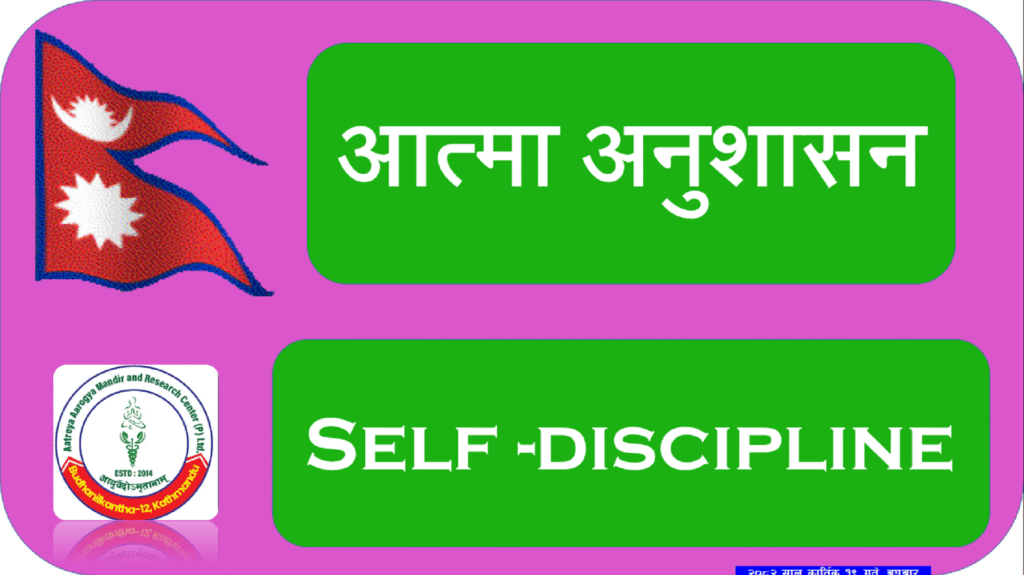Self-Discipline: The True Power of Life


Table of Contents
Introduction
Self-discipline means the ability to control one’s thoughts, speech and actions in accordance with wisdom and purpose.
It is not external control, but inner governance – the mastery of one’s impulses, emotions, and desires.
The Bhagavad Gita (6.5) beautifully states:
“Uddhared ātmanātmānaṁ nātmānamavasādayet,
Ātmaiva hyātmano bandhurātmaiva ripurātmanaḥ.”
Meaning — Elevate yourself by your own self; do not degrade yourself. The self alone is one’s friend and one’s enemy.
Meaning and Essence
The term आत्मा अनुशासन comes from:
आत्मा = self, mind, consciousness
अनुशासन = rule, discipline, regulation
Hence, it is the art of governing oneself — setting rules for one’s own behavior and following them with conviction.
It forms the spine of character and the foundation of spiritual and personal growth.
Types of Self-Discipline
Physical Discipline – Regulation of food, sleep, exercise and bodily habits.
Mental Discipline – Control of emotions, thoughts and mental focus.
Verbal Discipline – Practicing truthful, gentle and timely speech.
Spiritual Discipline – Meditation, prayer, celibacy and self-study.
Social Discipline – Responsibility and accountability toward family, society and nation.
Philosophical Foundation

In Eastern philosophy, self-discipline is the first step toward liberation (Mokhya).
In Yoga Darsana, it is defined as: “Yogaḥ cittavṛtti nirodhaḥ” — control of mental modifications.
In Nyaya and Saṅkhya, discernment and self-regulation are seen as the unique traits of humanity.
In Buddhism, Sheela (moral discipline) forms the base of Samadhi and Prajñā.
Psychological Perspective
Modern psychology views self-discipline as the ability to delay gratification — choosing long-term benefit over short-term pleasure.
Neuroscientifically, willpower resides in the prefrontal cortex, the brain region responsible for decision-making and impulse control.
Regular meditation, breathing exercises, and goal-oriented routines enhance this cognitive function.
Educational Perspective
In education, self-discipline represents inner motivation rather than external enforcement.
A disciplined learner studies out of awareness, not fear.
Practices like self-study (स्वाध्याय), time management, and mindful learning cultivate a self-disciplined intellect.
In Management and Leadership
Leadership without self-discipline cannot endure.
Peter Drucker said:
“The first and best victory is to conquer self.”
Great leaders, entrepreneurs, and healers sustain success through regulated routines, steady thoughts, and ethical decision-making.
Self-discipline builds credibility, consistency, and character — the triad of true leadership.
Ayurveda Perspective
In Ayurveda, self-discipline is the root of health (Svasthya).
Charaka Samhita says:
“Ātma-vinigrahaḥ sadā rogebhyaḥ parirakṣaṇam.”
-Self-control is the best protection against disease.
Forms of Self-Discipline in Ayurveda Lifestyle
Following Dinacharya (daily regimen) and Ritucharya (seasonal regimen)
Practicing moderation in diet (Mātrāśitva)
Observing Sadvritta (ethical and behavioral conduct)
Living by Achara Rasayana (code of wholesome conduct)
Meditation, prayer and spiritual self-study
A disciplined person resists disease, maintains mental harmony, and enjoys lasting vitality.
Benefits of Self-Discipline
Improves decision-making and focus
Reduces stress, anger, and impulsiveness
Increases productivity and resilience
Builds confidence and self-respect
Promotes longevity, balance, and peace of mind
Ways to Cultivate Self-Discipline
Set clear goals and priorities.
Maintain regularity and time consciousness.
Practice meditation and mindfulness daily.
Engage in self-reflection and self-dialogue.
Avoid laziness, greed, and indulgence.
Conclusion
Self-discipline is the inner strength that transforms knowledge into wisdom, and potential into power.
Without it, neither learning nor meditation nor health can be stable.
Swami Vivekananda said:
“He who conquers his mind conquers the world.”
Thus, self-discipline is not suppression, but self-mastery — the path that leads from chaos to clarity, from weakness to wisdom, from bondage to freedom.
Aatreya Ayurveda Philosophy
“A regulated life is the root of self-discipline, and self-discipline is the gateway to health.”
— Aatreya Aarogya Mandir, Budhanilkantha–12, Kathmandu
Author

Buddhi Prasad Paudel
Senior Consultant Ayurveda Specialist
Budhanilakantha-12, Kathmandu
+977 9851093655
aatreya.ayurveda.nepal@gmail.com
https://www.drbuddhipaudel.com.np
Author Biography in Summary
Clinical Ayurveda Practitioner with 33 years of experience | Expert in Ayurveda Lifestyle Coaching | Clinical Yoga Teacher | Clinical Panchakarma Specialist | Promoter of Vedic Food Habits | Specialist in Non-Pharmacological Chronic Pain Management | Marma Therapist (Chronic Neuro-Musculo-Skeletal Pain management) | Ayurveda General Practitioner | Policy Practitioner | Health Researcher | Health Administrator | Health Manager | Content Writer | Digital Marketing


